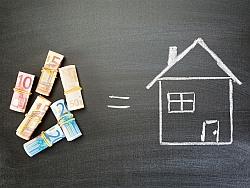It’s a great irony in the property business that having bought a dream home and investing more in it than in any other asset we own - more than any asset we’re ever likely to own, we don’t really know our property’s value.
 “The key is to see our houses as ‘live’ assets. Even if we have no intention of selling and see our houses as a home and refuge, it’s prudent to recognise that life can throw big challenges and enormous opportunities at you," says Quayle.
“The key is to see our houses as ‘live’ assets. Even if we have no intention of selling and see our houses as a home and refuge, it’s prudent to recognise that life can throw big challenges and enormous opportunities at you," says Quayle.Denis Quayle, Principal at Harcourts Maynard Burgoyne, says often, we don’t realise this.
“After all, most of us are working off a bond, so we can give a rough-and-ready estimate that pegs our property at about what our properties are bonded for. Or we might have a sense of what the municipality has valued the property for. Or we might notice out of the corner of an eye what our neighbours are selling for,” says Quayle.
“But the truth is that as a measure of value, bonds and valuation rolls rapidly become obsolete, and asking prices for houses are often an aspirational rather than a realistic gauge.”
Quayle says property is a dynamic industry - probably more so than any other - and prices represent a very real interplay between supply and demand.
“Our houses, in other words, are worth what others are prepared to pay for them. A complex range of factors determine this: the design and appeal of the house, state of repair, condition of the garden, not to mention the overall state of the neighbourhood and the condition of the country’s economy,” he says.
“Happily, overall property values tend to rise over time. The value of a property after owning it for, say, ten years is likely to be a more valuable asset than the one you paid for.”
Quayle says this is particularly true for the Western Cape, where growing demand for properties has injected a strong element of competition into the market, especially in the higher end of the market.
“Indeed, data from FNB’s Property Barometer – one of the most well-known sources of information and analysis on the industry - has referred to the Western Cape market as an ‘outlier’ of sorts,” he says.
“The latest available data (for 2016), put year-on-year home value growth in the province at a pleasing 8%. Real value appreciation is the name of the business.”
Why is it important to keep track of our properties’ values?
“Well, it helps us to understand the role our houses can play in your overall financial planning. Knowing what a property may be worth on the market, or what sort of loan it might be able to attract, is important of one of those once-in-a-lifetimes opportunities should present itself,” says Quayle.
“Indeed, for those of us fortunate to own in the Western Cape, this may be a pleasant surprise.”
Value also has a bearing on your insurance, which Quayle says is something else we tend to ignore.
“If we are vague on the market value - what it will sell for - odds are we have little idea of what it would take to fully rebuild in the event of a catastrophe,” says Quayle.
“The key is to see our houses as ‘live’ assets. Even if we have no intention of selling and see our houses as a home and refuge, it’s prudent to recognise that life can throw big challenges and enormous opportunities at you. Be ready to grab them.”
Take a look at recent sold prices in your suburb, street or complex to get an idea of what similar properties are selling for.








